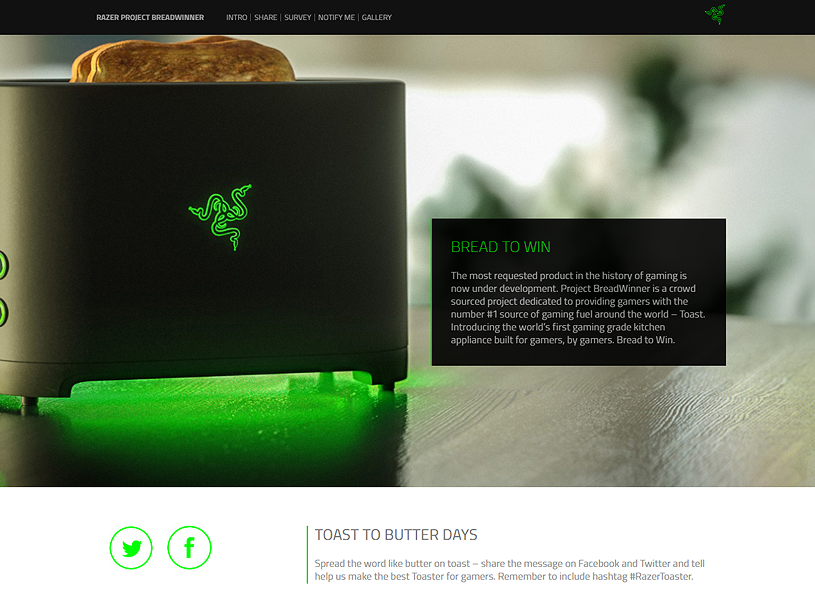
When you are at the forefront of gaming hardware, your fans demand the best out of everything you do. Our fans expect us to push the envelope - expecially when it comes to April Fools' Day.
With a dedicated community team, we started and continue to deliver the tradition of inventive and engaging April Fools marketing campaigns. We predicted the future of drones (hello selfie drones from 2014) with Razer Eidolon, built a levitating gaming mouse in 2015. In 2016, we turned to the community and elevated the die-hard, fan-driven "Give Us the Razer Toaster" movement with the same treatment we have for all our biggest product drives – a full-fledged, multi-channel campaign showing what happens when gamers design a kitchen appliance.
We can tell you the objective is to get a set number of click-throughs, but really, our team's aim was to creat not just a one-off joke, but an entire event that entertains the internet while suspending their disbelief. The focus of this campaign was to parody our own brand by taking an inside joke created by our fanbase and elevating it to the level of a proper Razer product launch. Success was measured in positive engagement, general campaign reach, the multitude of joke surveys submitted on the product page, and the continuing legend of the #RazerToaster in Razer's brand mythology.
How many other brands put this much effort into engaging with and trolling their community?
To ensure no fan gets left out of this most momentoast launch, we tailored our content for each social media channel, cumulating to an interactive website with partner involvement and a survey inviting customer feedback. All in the good name of fun, we've involved the press who can handle a joke or two.
The product had to be believable, technologically sane and most importantly, it had to be characteristically Razer.
Fortunately for us as a gaming hardware manufacturer, we're comprised of talented product designers and engineers who have the spare time to develop a Razer-specced toaster from blue prints to renders and physical prototypes.
Unfortunately for us, we're no PepsiCo with multi-million dollar advertising budgets, much less for a product we're unlikely to make. That however, is not what is required to deliver strong-impact, high visibility campaign, when we've cultivated a passionate fan base via a dedicated community management team consisting of content marketers and producers that speaks to the people both online and offline.
We created a range of rich-media comprising of video, scripted photography and visual renders to paint the future of the Razer Breadwinner concept toaster. From the seriously stylish trailers that everyone has come to expect or Razer, to the light-hearted, relatable content (a full-on infomercial, photography, skits, humorous ads) that brings us closer and in-line with our targeted gaming audiences.
The campaign was a long one in planning, having actually inserted the toaster prototype early in January with our fans picking up the Easter egg immediately. What started as a random fan request quickly snowballed into a full-service acknowledgement.
For Facebook, we stuck to a visually-rich method of conveying the arrival of the Razer Breadwinner concept whereas for the response-focused Twitter, we've chosen to adopt a more improvised back-and-forth with partners and influencers to spark further conversations. Being forward thinking with how we approach our social content, we've gone ahead to storytell on Instagram through short skits before the Stories feature came about. Apart from driving the original fan base that demanded for the Razer Toaster wild, the content has been enthusiastically received everywhere else.
The end-result is millions of impressions, video views and content engagement across all our online channels: which include press coverage and online influencer shares.
With a small budget, this was as effective as online marketing can get, with content produced almost entirely in-house.
We sure made a big enough impression for tech sites to cover a toaster by us:
Some went to the extent of exploring our past line of April Fools' products:
http://www.polygon.com/features/2016/4/4/11294008/razer-history-april-fools-day
This conversation continues way beyond April Fools', seeping into content we continue to make.
It has become uniquely our meme, a product that is engrained in the gaming community. A product that may exist if the fan-owned Facebook page accumulates over a million followers.
Did it hit whatever numbers we wrote? Definitely.
More importantly, did everyone have fun? Hell yeah.



